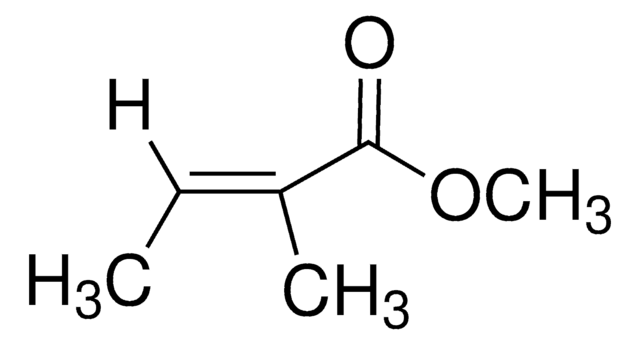T35203
trans-2,3-Dimethylacrylic acid
98%
Synonym(s):
Tiglic acid, trans-2,3-Dimethylacrylic acid, trans-2-Methyl-2-butenoic acid
Sign Into View Organizational & Contract Pricing
All Photos(2)
About This Item
Linear Formula:
CH3CH=C(CH3)COOH
CAS Number:
Molecular Weight:
100.12
Beilstein:
1236500
EC Number:
MDL number:
UNSPSC Code:
12352100
PubChem Substance ID:
NACRES:
NA.22
Recommended Products
Quality Level
Assay
98%
bp
95-96 °C/12 mmHg (lit.)
mp
61-64 °C (lit.)
density
0.969 g/mL at 25 °C (lit.)
storage temp.
2-8°C
SMILES string
C\C=C(/C)C(O)=O
InChI
1S/C5H8O2/c1-3-4(2)5(6)7/h3H,1-2H3,(H,6,7)/b4-3+
InChI key
UIERETOOQGIECD-ONEGZZNKSA-N
Looking for similar products? Visit Product Comparison Guide
Related Categories
Signal Word
Warning
Hazard Statements
Precautionary Statements
Hazard Classifications
Eye Irrit. 2 - Skin Irrit. 2 - STOT SE 3
Target Organs
Respiratory system
Storage Class Code
11 - Combustible Solids
WGK
WGK 2
Flash Point(F)
203.0 °F
Flash Point(C)
95 °C
Personal Protective Equipment
dust mask type N95 (US), Eyeshields, Gloves
Choose from one of the most recent versions:
Already Own This Product?
Find documentation for the products that you have recently purchased in the Document Library.
Customers Also Viewed
Susan Matthew et al.
Phytochemistry, 70(17-18), 2058-2063 (2009-10-10)
The Floridian marine cyanobacterium Lyngbya confervoides afforded cyclodepsipeptides, termed tiglicamides A-C (1-3), along with their previously reported analogues largamides A-C (4-6), all of which possess an unusual tiglic acid moiety. Their structures were deduced by one- and two-dimensional NMR combined
Inhibition of mitochondrial creatine kinase activity from rat cerebral cortex by methylmalonic acid.
P F Schuck et al.
Neurochemistry international, 45(5), 661-667 (2004-07-06)
Accumulation of methylmalonic acid (MMA) in tissues and biological fluids is the biochemical hallmark of patients affected by the neurometabolic disorder known as methylmalonic acidemia (MMAemia). Although this disease is predominantly characterized by severe neurological findings, the underlying mechanisms of
Shao-Liang Zheng et al.
Chemistry (Weinheim an der Bergstrasse, Germany), 14(2), 706-713 (2007-10-24)
[Zn(TA)2(H2O)2] (H-TA=tiglic acid) has been embedded in a framework composed of CECR (CECR=C-ethylcalix[4]resorcinarene) molecules to examine its E-->Z photoisomerization in a periodic framework. The photoisomerization of tiglic acid in CECR-[Zn(TA)2(H2O)2]4 H2O proceeds without the [2+2]-dimerization reaction that often occurs in
R H Lindecrona et al.
Food and chemical toxicology : an international journal published for the British Industrial Biological Research Association, 41(5), 647-654 (2003-03-28)
Groups of 10 male and 10 female rats were administered 0, 25, 100 or 400 mg octan-3-ol/kg body weight per day, 77 mg 2-methylcrotonic acid/kg body weight per day or 163 mg oct-3-yl 2-methylcrotonate/kg body weight per day by gavage
K D Santos et al.
International journal of immunopharmacology, 18(12), 761-769 (1996-12-01)
The present study was undertaken to assess the influence of 25 organic acids, which appear in high concentrations in tissues of patients with various organic acidaemias, on the proliferation of human peripheral lymphocytes stimulated with concanavalin A (Con A) (a
Our team of scientists has experience in all areas of research including Life Science, Material Science, Chemical Synthesis, Chromatography, Analytical and many others.
Contact Technical Service










